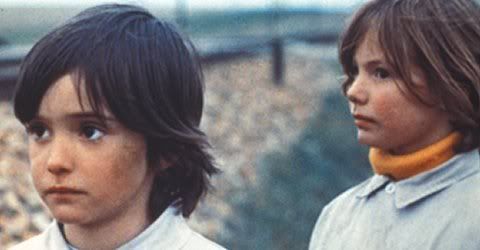I later saw the film Cría cuervos (1976) in a Spanish film class I was taking my senior year of college. I was floored by Ana Torrent's performance in the movie, and also in love with the film itself. The political undertones were astounding and it quickly made it's way to the top of my favorite films list.
Last night I saw El espíritu de la colmena (1973) directed by Victor Erice. I only know Victor Erice for El Sur, but mostly for his contribution to the film Los desafíos (1969), a film which I cannot even explain with words as it is trippy (due to the rising mod/psychedelic culture of the late 60s, early 70s), political and focuses largely on both American and Spanish stereotypes (as if it is a modern-day Bienvenido, Mister Marshall!). Thus, I knew the film would be focusing on the politics of Franco's Spain, but not really sure in what ways.

Still from the film of Ana Torrent and her older sister in the film, Isabel.
WARNING: SPOILERS WITHIN!
The film begins with Frankenstein's premier in the small Castillian village, Hoyuelos. Un peseta para adultos, dos reales para niños. Ana and her older sister, Isabel, are mesmerized by the film. Isabel is the typical older sister, playing on Ana's naivete telling her that Frankenstein really exists as a spirit in an abondoned farmhouse in their small pueblo. We are introduced to the mother as she is writing a letter to a lost-love due to the Civil War, she writes of nostalgia which is a critique on Franco's Spain as she longs for better days. We also see Ana and Isabel's father tending to the bees en la colmena. Their father writes about the bees and the hierarchy amongst them in his study at nighttime. The maid, Milagros (which translates to miracles in English) is the first female to interact with the father in the film. The structure of the family appears to be familiar and because of the size of their house and the presence of a maid, one can assume that the family is considerable wealthy in their small village.
As Franco reinforced Catholic values, especially the importance of family, the film is critical of the familial unit as there is never a shot throughout the movie of the family together. They are only shown separately with two family members in the same frame at once. Erice has his two young actresses playing their roles expertly. Isabel and Ana are both curious youngsters growing up in a post-war world. Isabel is clearly more vindictive, as she teases Ana, plays with her friends by jumping over a small fire and towards the end of the film, she nearly chokes her cat to death. The cat retaliates and cuts her finger, which prompts Isabel to use her own blood as lipstick. Her natural disposition is revealed as the dominant sibling, and reflects the manipulative politics of Spain's franquismo in its time whereas Ana reflects the more liberal attitude through her naivete and ultimately being a good girl when faced with good v. bad situations.
The film alludes to the good v. bad theme numerous times, the most harrowing example is when Fernando, their father, is with his daughters hunting for mushrooms. Ana proclaims that the one mushroom which her father warns is the deadliest smells so good. The viewer naturally fears that Ana will eat the mushroom due to her inquisitive nature, however as the movie proceeds, we see that Isabel is the one whose actions should be watched. Ana questions her mother about spirits, and her mother responds that good spirits talk to good girls but the bad spirits, who are very very bad, talk to bad girls. Towards the end of the movie, Ana finds her sister Isabel dead on the floor in the bedroom. One could assume that Isabel has essentially killed herself through fould play; all we hear is a shriek and all we see is a broken flower pot, a rocking chair still in motion and the girl dead on the hardwood floors of the house.
One must believe (after seeing Isabel's empty bed at the conclusion of the film), that Isabel died at the hands of her own curiosity (as we hear a shriek and see her body on the floor without getting any real answers). Ana's persistent 'good' character might reflect the idealism that the youth under Franco embodied. As Ana is younger than Isabel and displays intrigue through kind measures, we are drawn in by her enticing yet daunting childhood world. Perhaps this represents another parallel between Spanish society and Ana. The Spanish Civil War ended in 1939 with Franco as the victor, however, youth are notorious for remaining positive and for rallying as the liberal position in times of turmoil. Thus, part of her role can be translated as such. Isabel, on the other hand, signifies the corruption of Franco's Spain and it's self-destruction as well.
Ana Torrent's performance is enlightening and endearing. Unlike Isabel, whose trust the viewer does not have, the audience is able to sympathize with Ana's efforts to be good. Her acting is so impressive, to think that she was only thirteen when the film premiered (born in 1966 - filmed in 1973), she blows Dakota Fanning out of the water. Her character is moving, compelling and her face is what the viewer remembers whilst re-thinking the various elements of the movie.
MOLTO BRAVO ANA TORRENT. A true actress in modern film.


No comments:
Post a Comment